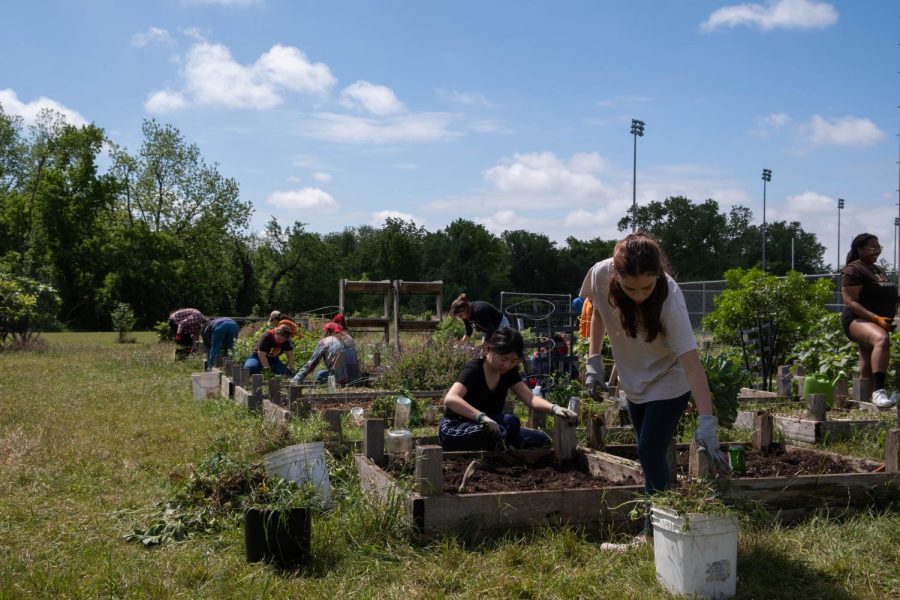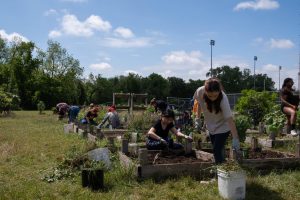City of Austin, Travis County announce food plan to help prevent future resident, student food insecurity
UT Students garden at the Campus Environmental Center Microfarm on April 9, 2023.
April 18, 2023
The city of Austin Office of Sustainability and Travis County are partnering together to create the area’s first food plan following concerns of rising food insecurity, an effort the entities say will strengthen the local food system and access.
The plan will address supply chain-related food insecurity issues following emergencies such as the COVID-19 pandemic and Winter Storm Uri in 2021. The food plan intends to adjust inventory methods of local grocery stores to ensure Austin residents have consistent access to food.
“For Austin to be a thriving, healthy and just community, it must have an equitable, sustainable and resilient local food system,” the 2022 State of the Food System Report states, which prompted the creation of the food plan. “When we think about what makes Austin unique, often the first things that come to mind are related to food — barbeque, breakfast tacos, food trucks and other special food offerings. Food connects us not only to places but to each other.”
Edwin Marty, the food policy manager of the Office of Sustainability, said Austin’s food insecurity rates first rose due to inventory issues in grocery stores during the pandemic.
Marty said the current delivery process relies on “just-in-time” deliveries, where food is ordered and shipped right when the customer needs it. As a result, grocery stores only keep roughly two days worth of food in stock. However, this means when delivery methods are disrupted due to natural crises, supply runs out fairly quickly.
The ultimate goal of the plan is to adjust the amount of food kept in stores in order to prevent future shortages, Marty said.
“It’s important to recognize that COVID had a tremendous impact on our community,” Marty said. “We continue to have incredibly elevated rates of food insecurity compared to other places.”
The food report states that 14.4% of residents in Travis County experience food insecurity, while a 2022 Student Government report says 1 in 3 UT students face food insecurity.
“It has become a much bigger issue in the last 20 to 25 years, and really, the research is just unequivocal that a huge number of college students are having to make such difficult decisions about staying enrolled in college or having another part-time job to try to put food on the plate,” Marty said.
UT Outpost, the University’s free food pantry, is trying to alleviate this pressure off of students and address campus food insecurity. The kitchen is run almost entirely off of donations, including produce grown at the Microfarm, UT’s student-run farm.
“People don’t realize how often (food insecurity is) faced specifically by college students,” said Alicia Rusthoven, Microfarm co-lead and environmental science senior. “People don’t realize when they are food insecure a lot of times. It’s something that people have doubts about because they think ‘Oh, that’s something that sounds really bad. I can’t be experiencing it.’”
Due to rising living costs and increased student enrollment, Valeria Martin, the UT Outpost coordinator, said the pantry sees up to 300 students a week.
“We really push the narrative that there are no barriers to entry for the food pantry,” Rusthoven said. “If you don’t know where your next meal is coming from next week, go ahead and get some food. You have a right to eat and a right to nutritious food.”













